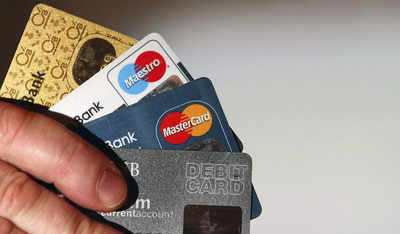Top Searches
- News
- Business News
- India Business News
- Explained: How credit card usage impacts your credit score and other financial transactions
Explained: How credit card usage impacts your credit score and other financial transactions

NEW DELHI: Several studies have shown that consumers tend to spend more when they pay with credit cards than when they pay with cash. With the shopping season around the corner, there will be an urge to maximise our credit cards, lured by the various offers and discounts.
However, credit Card overuse can negatively affect your creditworthiness and lower your Cibil score- which is a three-digit number that determines your creditworthiness and is used by other lenders as a means of assessing whether or not they should lend to you. In fact, the CIBIL score plays an important role in even availing a favourable rate of interest on credit products.
Overusing a credit card may lead to unnecessary shopping and cyclic debt every month.
What is a credit limit and a credit over limit?
Credit limit is the maximum amount you can spend using your credit card at any given time. Credit card limits are imposed to make sure that you can repay the money you borrow within a certain period of time without falling into a debt trap. The credit limit is determined through several factors such as income, credit profile, credit worthiness etc. Normally, the credit card limit is set by the issuer at the time of issuing the card, but the limit can be revised periodically depending on the card holder's repayment history, credit score, income, and so on.
Credit over-limit refers to the situation when you use your credit card beyond the specified credit limit. Credit over-limit is a facility allowed to all credit card users. You can have the option to either cancel the transaction that crosses the credit line or to continue the transaction over-limit.
"Though it is a facility offered by the issuer, you should remember that such over-limit credit use is generally subjected to certain terms and conditions," explains Bajajfinserv markets.
Here’s how your credit card impacts your credit score
Your credit card repayment history:
The single-biggest factor impacting your credit card is your card repayment history, according to Bankbazaar. This accounts for nearly 35% of your credit score. In order to ensure that you always maintain a good credit score, ensure that you pay your credit card bill on time. And if you fail to pay the credit card bill before the due date, you have to pay higher interest and an additional late fee.
Overutilization of credit limit:
Typically very high utilization, say more than 70/80% of your overall limit may negatively impact your credit score. "Very high utilization may result into you missing the payments and hence, is always seen cautiously by lenders. Timely repayment of your dues is very critical to maintain and improve your credit score. Even the default of one EMI is reflected on your credit report and has a bearing on your credit score," said Anurag Sinha, Cofounder & CEO of credit score planner OneScore & OneCard.
A high utilization also reveals an individual’s lack of control over spending. Moreover, various credit card companies calculate credit limits based upon the income of an individual. If you use too much credit, banks assume that you have too much debt.
Do not pay less than the minimum due amount:
All credit card users should pay either the full outstanding bill amount or above the minimum due.
For credit card repayments, bear in mind that paying just the minimum amount due, often called MAD, doesn’t impact your repayment behavior adversely. It is not considered as default, but it attracts interest and other charges, if any, which may increase overall outstanding amount. " This may make future payments difficult. Credit card is a great convenience product, it surely allows you to fulfill your shopping desires while allowing you interest-free period upto 45 days. One should only take care of making timely & quick repayments to avoid levy of interest & charges," added Sinha.
Avoid exceeding your Credit Utilisation Ratio (CUR)
Credit Utilisation Ratio shows your usage concerning your credit card limit in a month.
Suppose your credit limit is Rs 1 lakh, but you spent Rs 90,000. In this case, your CUR will be 90%. "A high CUR is seen as credit-hungriness. This lowers your credit score. It’s okay to hit your spending limit once in a while for emergencies or critical events such as weddings or foreign trips, but don’t make it a habit. Try to stay under 30%. Always repay your dues in full the same month. The rewards and discounts won’t be worth it if you start paying interest on your daily purchases. Full and timely payment will help you build a strong credit score and help you avail enhanced credit limits or loans at attractive terms," said Adhil Shetty, CEO of BankBazaar.
Set up automated payments
Set up automated payments, even for the minimum amount, to ensure due dates don't get missed. Automated payment is a scheduled electronic transfer of money to pay a bill from your credit card account to a vendor, biller, or merchant. The amount due for payment is collected by the biller automatically according to the set payment schedule.
Avoid multiple credit applications simultaneously
In your attempt to reap the offers, discounts and credit periods on each credit card, users should avoid making multiple credit applications at the same time. Excessive credit-seeking behaviour often results in your score negatively. The rule of thumb is that you shouldn’t have more than three active credit cards.
"You may not be able to keep track of payments on all the cards. This may lead to a default in payment. Too many credit cards, is to a lender, a sign that you are excessively dependent on credit. At the end of the day, it is important to remember that your CIBIL score is not based only on your credit card usage. The score takes into consideration all credit products. So, a personal loan or a home loan that you have will also impact your CIBIL score," cautions BankBazaar.
Risk of declined transactions
Credit card transactions will ultimately get declined after a point if one exceeds their credit limit.You should know the credit limit and keep track of balances for each of your credit cards so you aren’t blindsided by reaching the limit before your monthly statement period ends. Moreover, frequent overshooting on the card may also result in the issuing company to deactivate the card.
Opt for EMI
Most of the credit cards today provide various consumer-friendly EMI options. You can convert your transactions during a purchase at the merchant or by visiting the app of your card issuer after purchases. This helps with your repayments without limiting your shopping list and any adverse impact on your credit score, advised Sinha.
Are there any advantages then?
Yes there are advantages provided you use your credit card the right way.
"A credit card is an effective and highly useful financial instrument if you use it wisely to manage your day-to-day expenses. Besides earning reward points, you can get interest-free EMIs, discounts, and festive offers. Credit cards come with a pre-set credit limit. You can spend within this limit, but exhausting it may dent your credit score. Whatever you borrow through your credit card, the same needs to be repaid within a stipulated time," says Adhil Shetty. CEO of BankBazaar.
However, credit Card overuse can negatively affect your creditworthiness and lower your Cibil score- which is a three-digit number that determines your creditworthiness and is used by other lenders as a means of assessing whether or not they should lend to you. In fact, the CIBIL score plays an important role in even availing a favourable rate of interest on credit products.
Overusing a credit card may lead to unnecessary shopping and cyclic debt every month.
What is a credit limit and a credit over limit?
Credit limit is the maximum amount you can spend using your credit card at any given time. Credit card limits are imposed to make sure that you can repay the money you borrow within a certain period of time without falling into a debt trap. The credit limit is determined through several factors such as income, credit profile, credit worthiness etc. Normally, the credit card limit is set by the issuer at the time of issuing the card, but the limit can be revised periodically depending on the card holder's repayment history, credit score, income, and so on.
Credit over-limit refers to the situation when you use your credit card beyond the specified credit limit. Credit over-limit is a facility allowed to all credit card users. You can have the option to either cancel the transaction that crosses the credit line or to continue the transaction over-limit.
"Though it is a facility offered by the issuer, you should remember that such over-limit credit use is generally subjected to certain terms and conditions," explains Bajajfinserv markets.
Here’s how your credit card impacts your credit score
Your credit card repayment history:
The single-biggest factor impacting your credit card is your card repayment history, according to Bankbazaar. This accounts for nearly 35% of your credit score. In order to ensure that you always maintain a good credit score, ensure that you pay your credit card bill on time. And if you fail to pay the credit card bill before the due date, you have to pay higher interest and an additional late fee.
Overutilization of credit limit:
Typically very high utilization, say more than 70/80% of your overall limit may negatively impact your credit score. "Very high utilization may result into you missing the payments and hence, is always seen cautiously by lenders. Timely repayment of your dues is very critical to maintain and improve your credit score. Even the default of one EMI is reflected on your credit report and has a bearing on your credit score," said Anurag Sinha, Cofounder & CEO of credit score planner OneScore & OneCard.
A high utilization also reveals an individual’s lack of control over spending. Moreover, various credit card companies calculate credit limits based upon the income of an individual. If you use too much credit, banks assume that you have too much debt.
Do not pay less than the minimum due amount:
All credit card users should pay either the full outstanding bill amount or above the minimum due.
For credit card repayments, bear in mind that paying just the minimum amount due, often called MAD, doesn’t impact your repayment behavior adversely. It is not considered as default, but it attracts interest and other charges, if any, which may increase overall outstanding amount. " This may make future payments difficult. Credit card is a great convenience product, it surely allows you to fulfill your shopping desires while allowing you interest-free period upto 45 days. One should only take care of making timely & quick repayments to avoid levy of interest & charges," added Sinha.
Avoid exceeding your Credit Utilisation Ratio (CUR)
Credit Utilisation Ratio shows your usage concerning your credit card limit in a month.
Suppose your credit limit is Rs 1 lakh, but you spent Rs 90,000. In this case, your CUR will be 90%. "A high CUR is seen as credit-hungriness. This lowers your credit score. It’s okay to hit your spending limit once in a while for emergencies or critical events such as weddings or foreign trips, but don’t make it a habit. Try to stay under 30%. Always repay your dues in full the same month. The rewards and discounts won’t be worth it if you start paying interest on your daily purchases. Full and timely payment will help you build a strong credit score and help you avail enhanced credit limits or loans at attractive terms," said Adhil Shetty, CEO of BankBazaar.
Set up automated payments
Set up automated payments, even for the minimum amount, to ensure due dates don't get missed. Automated payment is a scheduled electronic transfer of money to pay a bill from your credit card account to a vendor, biller, or merchant. The amount due for payment is collected by the biller automatically according to the set payment schedule.
Avoid multiple credit applications simultaneously
In your attempt to reap the offers, discounts and credit periods on each credit card, users should avoid making multiple credit applications at the same time. Excessive credit-seeking behaviour often results in your score negatively. The rule of thumb is that you shouldn’t have more than three active credit cards.
"You may not be able to keep track of payments on all the cards. This may lead to a default in payment. Too many credit cards, is to a lender, a sign that you are excessively dependent on credit. At the end of the day, it is important to remember that your CIBIL score is not based only on your credit card usage. The score takes into consideration all credit products. So, a personal loan or a home loan that you have will also impact your CIBIL score," cautions BankBazaar.
Risk of declined transactions
Credit card transactions will ultimately get declined after a point if one exceeds their credit limit.You should know the credit limit and keep track of balances for each of your credit cards so you aren’t blindsided by reaching the limit before your monthly statement period ends. Moreover, frequent overshooting on the card may also result in the issuing company to deactivate the card.
Opt for EMI
Most of the credit cards today provide various consumer-friendly EMI options. You can convert your transactions during a purchase at the merchant or by visiting the app of your card issuer after purchases. This helps with your repayments without limiting your shopping list and any adverse impact on your credit score, advised Sinha.
Are there any advantages then?
Yes there are advantages provided you use your credit card the right way.
"A credit card is an effective and highly useful financial instrument if you use it wisely to manage your day-to-day expenses. Besides earning reward points, you can get interest-free EMIs, discounts, and festive offers. Credit cards come with a pre-set credit limit. You can spend within this limit, but exhausting it may dent your credit score. Whatever you borrow through your credit card, the same needs to be repaid within a stipulated time," says Adhil Shetty. CEO of BankBazaar.
FOLLOW US ON SOCIAL MEDIA
FacebookTwitterInstagramKOO APPYOUTUBE
Start a Conversation
end of article










